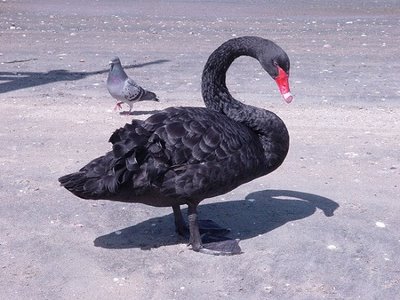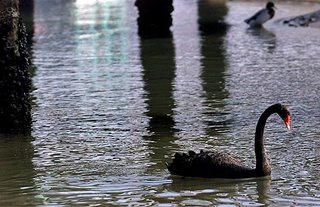Rupert's Passing Is More Than Just a Sad Swan Song
Rupert, how we loved ye.....

Rupert the Black Swan, Newport Harbor's most beloved resident, will get a fitting send-off.
By Mike Anton, L.A. Times (Staff Writer)
September 20, 2006
It has been a week since the untimely death of Newport Harbor's most beloved resident, and people there remain shaken. Not due to the particularly gruesome end — mowed down by a fast-moving sheriff's patrol boat — but because Rupert's many friends simply aren't ready to let go.
Said Jim Mahoney, owner of a gondola cruise company. "He was a celebrity in this harbor. Next to John Wayne, he was the most famous creature who ever lived in Newport Beach."
Indeed, Rupert the Black Swan was no ordinary fowl.
An Australian swan, he ruled the roost in Newport Harbor since he mysteriously arrived in the early 1990s, endearing himself to locals, enchanting tourists, charging yachts and going after swimmers who made the mistake of wearing red bathing suits.
Rupert hated the color red. He also was Newport's unofficial mascot, looked after by everyone, including the same Harbor Patrol deputies who accidentally killed him Sept. 13 while responding — in their red boat — to a report of a dead body.
Rupert was about 16 and left no survivors that anyone is aware of.
In death, he remains as large as he did in life.
A planned "paddle out" memorial service tentatively scheduled for Sept. 30 is expected to draw dozens of boaters, kayakers and canoeists who will escort Rupert's cremated remains to a burial at sea.
"I knew people loved him, but I had no idea how many," said Gay Wassall-Kelly, a 66-year-old bay-front homeowner who fed and looked after Rupert for most of the swan's time in Newport Beach. "People knew Rupert from one end of the harbor to the other."
Wassall-Kelly chronicled Rupert's activities in the weekly Balboa Beacon newspaper, which she publishes.
A final sighting dispatch appeared on Page 2 recently: Balboa Peninsula, 4 p.m. on Thursday here comes Rupert the Royal strutting up on the beach at 10th & Bay looking around, sticks his beak up in the air and takes (off) swimming again.
"In the latest issue, he's the whole front page," Wassall-Kelly said. "I'm putting it together now, and I can't stop crying."
In the past week, Wassall-Kelly has received scores of phone calls, cards and e-mails expressing condolences; one woman called from Utah, where she was on vacation. People left flowers on her doorstep.
Pamela Goode, who runs a harbor cruise company, left red carnations.
"Rupert was a regular with me," Goode said, noting customers were amazed at how he responded when called and ate wheat grass seed and drank bottled water out of her hand. "It was like, 'Is he on the payroll?' "
Rupert's outgoing personality won people over. His fearlessness got him into trouble. On several occasions, the 15-pound bird with the 5-foot wingspan was rescued after being entangled in fishing line or impaled by fish hooks.
In 2000, he nearly died after being exposed to diesel fuel. Two years later, his mate, Pearl, died after being similarly exposed.
"After she died, he was going around the harbor calling for her," said Debbie McGuire, wildlife director at the Wetlands and Wildlife Care Center in Huntington Beach, who treated both of them.
Eventually, Rupert was brought in to see Pearl. McGuire said it offered him closure. "He was kind of mopey after that," she said. "They were inseparable."
McGuire is helping coordinate Rupert's memorial service, at which Newport's Imua Outrigger Canoe Club plans to conduct a traditional Polynesian burial service, which will include prayers and dropping leis into the sea.
About two dozen other boat owners have expressed interest in joining the procession, a number McGuire predicts will grow.
"I'm afraid it might get quite large," she said. "He's going to get a bigger memorial service than I will ever have."

